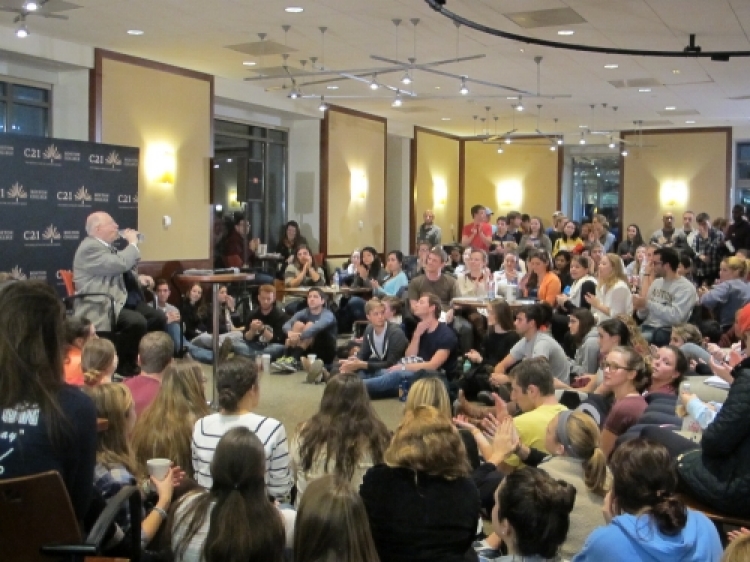
By
The caffeinated faith conversation that is the trademark of Boston College’s popular Agape Latte program is now sparking similar conversations at colleges as far away as Ohio and Indiana. Through an outreach program supported by an anonymous grant, the Church in the 21st Century Center has exported the Agape Latte program to 10 other colleges, with some 20 additional schools either poised to, or in talks to, launch Agape Latte this year.
At BC, more than 5,000 students have listened to nearly 50 different speakers over the course of Agape Latte’s nine-year run on campus. Offered by C21 in partnership with Campus Ministry, the successful, student-driven program – which derives its name from the Greek word for selfless, unconditional love that seeks nothing in return – uses personal stories on the intersection of faith and life to teach students lessons about life’s big questions. The storyteller — a faculty or staff member — tells personal, authentic accounts about friendship, hope, forgiveness or prayer, allowing for plenty of post-event conversation with students in the audience.
“We’ve found a way to make faith fun and it has captured the curiosity not only of our own students, but of students at other universities,” said Karen Kiefer, C21 associate director. “Hearing these personal stories has helped students in their own journey.”
This year, BC’s series will kick off with a special event, Agape Latte Beanpot, on Sept. 29 in Robsham Theater. The speaker will be Kerry Cronin, a Philosophy Department faculty member who is director of BC’s Lonergan Institute. Doors open at 7 p.m. with a musical performance by BC student band Juice, followed by a trivia contest. Cronin’s talk will begin at 8:30. Members of the Agape Latte partnership colleges are expected to attend.
Schools that have already launched Agape Latte include the College of the Holy Cross, Canisius College, Assumption College, Manhattan College, University of Dayton and University of Saint Francis in Indiana.
Interestingly, noted Kiefer, not all the colleges replicating Agape Latte are Catholic institutions. Babson College, where it is estimated only 20 percent of the student population is Catholic, has brought the program to its campus, and the University of Wisconsin and University of Rochester are getting ready to launch Agape Latte.
Kiefer and her team offer full support to the schools adopting Agape Latte. “We Skype with the students and other representatives of the schools. We give them packets of information that answer their questions and tell them what the key ingredients are that make Agape work.”
About a half-dozen of the colleges have made a pre-launch visit to BC to witness an Agape event live. While schools can adapt the program to their campus culture, they are required to use the Agape Latte logo.
Agape has been embraced at other colleges in much the same way it has at BC, organizers say. “The experience was very cathartic and moving,” Holy Cross Professor Stephanie Yuhl said about her school’s Agape event. “It felt human and authentic, and offered a space for everyone to be present, which is a real gift in our fast-paced lives.”
At Assumption College, student Shannon MacDonnell said her school’s Agape Latte event “made me feel that all the things we go through, that seem like such a big deal, are just a small piece of our journey.”
Another Assumption student, Kailey Filiere, added, “I thought it was great how [the speaker] opened up about his experiences and how his faith helped him to grow as a person and affect others.”
See the Agape Latte website at https://www.bc.edu/church21/studentcorner/agapelatte.html



